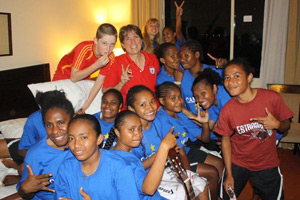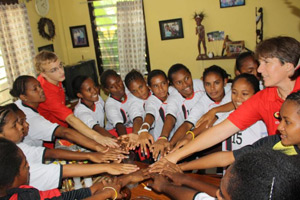“Aduuuuuh, MAMA!!!” That was all the girls said over and over. With tears in their eyes and big smiles on their faces, they ran across the field and jumped straight into my arms. The match was over and we had just won the Girls' Football Championship of West Papua after scoring three goals against the Indonesian champions from Tolikara. My girls were filled with joy and I, as their coach, mentor, and “mama,” was extremely excited for them.
Officials from the other team sat stunned, while the crowd of more than three thousand cheered in awe. How could it be that this team from the highlands, which had never been beaten by a team from the coast, had lost by 3:0? How was it possible that my girls, who are so inexperienced, small, and young, had defeated the “Goliath” from Tolikara?
The girls are only 14 to 18 years old, but have already succeeded in making their families proud, even though few people believed in them—or their ability to win the tournament.
The key for this success lie deep in their hearts. They had listened to advice and encouragement, and had started to believe in their skills. Furthermore, they had worked hard as a team and, most importantly, had put their trust in God.
At Last, Unified and Praising God
After receiving the trophy, we drove to our house, where the players had stayed overnight before the final match. One of the girls immediately picked up the guitar and began singing worship songs. Others soon joined in.
 |
The twenty girls praised the Lord in harmony, and before we knew it, everyone was dancing around the table. It touched my heart to see the girls celebrating their victory and praising God through their songs. Together we play, sing, and pray—all for the glory of our Father in heaven.
Only one year ago, these girls did not even get along. Some had a history of abuse. Each came from a different background and tribe. True and deep friendships between people from different tribes are atypical in the Papuan culture, where murder still happens in tribal conflicts.
But God made fair play and friendship possible. Through continuous coaching, counseling, teaching, and Bible studies, the girls discovered what it meant to use their talents to help, encourage, and even forgive each other. Through regular football practices, they learned discipline and found that success was the result of hard work. Today, they are able to see the fruits of more than a year of practice and character training.
God gave us strength and endurance; he kept the team together when we were facing many challenges. Although we had to deal with bribed referees and corrupt officials, the girls played so well that nobody was able to stop them. ![]()
God has shown through these girls that change of character and mindset is possible, and that tribal wars can end on the football field.
Football is very important and plays a decisive role in Papua. Success in football can improve the self-esteem of Papuans, who feel inferior to other Indonesians in daily life. Improving self-esteem through success in football directly influences other areas of life. This means that as soon as Papuan children realize they are capable of achieving success by winning football matches—through practice and discipline—then they also become aware of their ability to achieve success in their education, if they listen to the teachers and are disciplined.
Background
Because women's football in Papua is very promising, it is frustrating that few people seem to care about the talents of these girls. We needed to set an example by coaching a girl’s team in order to convince the public and the Indonesian National Football Association (PSSI) of the importance of supporting a women’s national football team.
Unfortunately, neither the national nor the Papuan Football Association has seen the need for long-term development of women’s football. Officials only organize one football event for women each year: the Papuan Championships. The next year, the provincial champions compete in one major event, the National Championship Tournament. The Indonesian Football Association does not give assistance to run regional or national non-professional or professional women's leagues. Therefore, it has been difficult for Indonesia to provide a successful national women’s football team.
After being chosen to coach the Indonesian national women’s football team for the 2008 Asian Championships in Vietnam, my husband, Rainer (UEFA B-license), and his brother, Timo (DFB A-license), saw the potential of Indonesian women’s football. The national players from the province of Papua showed especially solid skills.
Because the Indonesian Football Association did not keep its promise to start a women's football league after the Asian championships, the players were sent home after the tournament. It was obvious we had to give these girls hope. In October 2009, Rainer and I organized a football tournament for high school girls in Jayapura. From the sixteen schools that took part in the tournament, we selected twenty-two girls and started a new team, “Galanita Persipura U-18.”
Since then, we have officially played for “Persipura Jayapura,” the professional men’s football club representing Jayapura. The club management was amazed when we offered to coach the girls for free and to look for private sponsors.
 |
After only a year of coaching, we won the Papuan championships in December 2010; after another few months of additional Futsal (indoor football) coaching, we won the first Papuan Futsal Tournament for girls in May 2011, which was organized by a local pastor. There, we competed against senior teams with experienced Papuan players. Our team scored sixty goals in six matches (18:0; 6:2; 10:1; 6:3; 12:1; 8:3). The final took place in the main sports hall of Jayapura, where around two thousand people watched our victory. Additionally, our young keeper, Fience Pepuho, received the trophy for being the best keeper of the tournament.
Going Forward
In June 2011, we began a new program for the girls. We rented a house, where the girls receive teaching in mathematics, English, and computer skills. The house serves as a shelter for girls who live in difficult family situations or who have been abused. They can stay at the dormitory, where a Papuan Christian woman cares for their daily needs. The girls live, play, work, and cook together. I coach some of them to run small business projects. For example, the girls produce doughnuts and other snacks to sell on the main road. Part of their income helps cover the operational costs of the dorm. ![]()
These girls do not have the chance to change their future on their own yet, but we can help them to believe in their strengths and improve their self-confidence through success in football and through better education. They deserve the chance to show the world that they are talented girls; we can help them by providing professional coaching and mentoring, as well as a good education. The system will never change if we cannot give a convincing reason why it should change.
Please support our Papuan girls' football team by:
- Praying
- Providing scholarships for players to receive a better education in a good university in Indonesia
- Sponsoring one of the girls to study and play in a professional club in another country which already has a professional women's football league.
If you would like to help us develop Indonesian women’s football, email Heidi_Scheunemann@yahoo.de.

